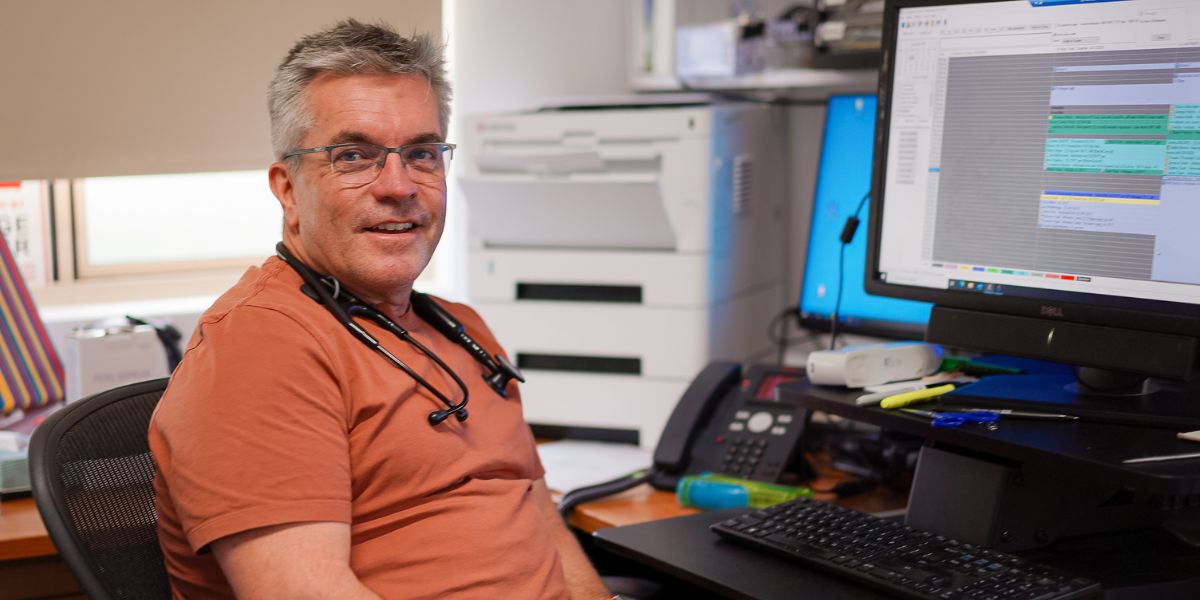With health a major issue in this year’s election, Armidale-based doctor Dr Rod Martin is stepping into the spotlight as a prominent voice in the debate.
After nearly two decades working in rural and remote communities, Dr Martin has been appointed President of the Australian College of Rural and Remote Medicine (ACRRM), a role that places him at the forefront of efforts to improve healthcare in regional Australia.
The two-year presidency places Dr Martin at the helm of ACRRM, the peak body responsible for training and representing rural generalist doctors across Australia.
This appointment comes at a pivotal moment for the profession, as ACRRM pushes for formal recognition of rural generalism as a medical speciality.
“We’re on the brink of something important,” Dr Martin says.
“Rural generalism is finally being recognised as a specialty in its own right. That changes how systems support us, and how future students see this career path.”
His new role not only reflects his professional accomplishments, but his deep commitment to addressing health inequity, supporting rural medical careers, and training the next generation of rural doctors.
Originally a city-born scientist, Dr Martin worked in Brisbane laboratories for nearly a decade before making the switch to pursue a career in medicine. He says it was the breadth of rural generalist medicine and ability to make a real impact that appealed most to him.
“Like lots of rural generalists, I like the added responsibility, the diversity of practice, the breadth of things I have to do,” he says.
“There’s rarely a dull moment.”
He began his medical career with a move to Theodore – a small central Queensland town with a population count of 500 – for what was meant to be a short-term stint.
After completing his medical training and final internship in St George, 600 kilometres west of Brisbane, he quickly became drawn to rural practice. It wasn’t just the variety of the work that appealed, but the community connections and sense of purpose.
“People are dying younger and having less fulfilling, less healthy lives, particularly post-COVID,” he says.
“That’s what drives most rural and remote doctors. If we can reduce that inequity – even a bit – it’s worth it.”
Dr Martin relocated to Armidale 14 years ago, and stayed.
“I always thought I’d end up somewhere much smaller than this,” he says.
“But I’ve been able to do pretty much all the things I have planned to do – and then some.”
In that time, he has worked across emergency, anaesthetics, obstetrics, and primary care, often all within a single week.
That diversity, he says, is exactly why rural generalists are so essential to regional hospital systems, and why ACRRM is pushing for proper recognition.
“People often assume rural generalists are filling gaps until a ‘real’ specialist arrives,”
he says.
“But in reality, we’re doing complex, frontline work, often as the only doctor in town.”
“Without proper recognition, many rural hospitals, including larger centres like Armidale, will struggle to stay open and safe. It’s a critical piece of the puzzle,” he adds.
He hopes the formal recognition of rural generalists will also improve recruitment and retention, creating a more stable workforce and attracting future doctors to the profession.
As President, one of his goals is to create clearer, more supportive pathways for medical students interested in rural practice.
“What I really want is for a medical student from here, who expresses an interest in rural generalism, to have their path mapped out for them; someone to give them advice at every stage and clear the next bit of the trail ahead.”
His own path was shaped by mentors, including a senior doctor in Theodore who also served as ACRRM president. That influence, combined with the opening of a medical school in Armidale, helped cement his decision to stay regional.
Now, he’s working to ensure others have the same opportunities. He also wants to position ACRRM as the go-to organisation for rural health policy and models of care tailored to community needs.
“We need models that suit different sizes and locations. In some places, the rural generalist can do almost everything. In others, you need a close partnership with a metro-based specialist. It’s not one-size-fits-all.”
Since Dr Martin first qualified, ACRRM has grown significantly.
Today, it trains and represents more than 4,500 members, including registrars and fellows across Australia, New Zealand and the Pacific Islands.
His presidency comes at a time when states and territories are grappling with staff shortages, ageing infrastructure, and increasing pressure on regional health systems.
“I think unless we achieve proper recognition and integration of rural generalists into hospitals, places we’ve always assumed will stay open will begin to fall over,” he says.
The role, he admits, is demanding, sometimes exhausting, but deeply rewarding.
“It’s a write-your-own-adventure kind of job,” he says.
“It’s sometimes chaotic, but it’s good fun.”
As President, Dr Martin is determined to ensure rural generalists across the country receive the support, recognition, and resources they need to keep their communities safe, and their careers sustainable.
Advertising with New England Times is a cost effective and reliable way to reach New England locals who are interested and engaged. Find out more here.


